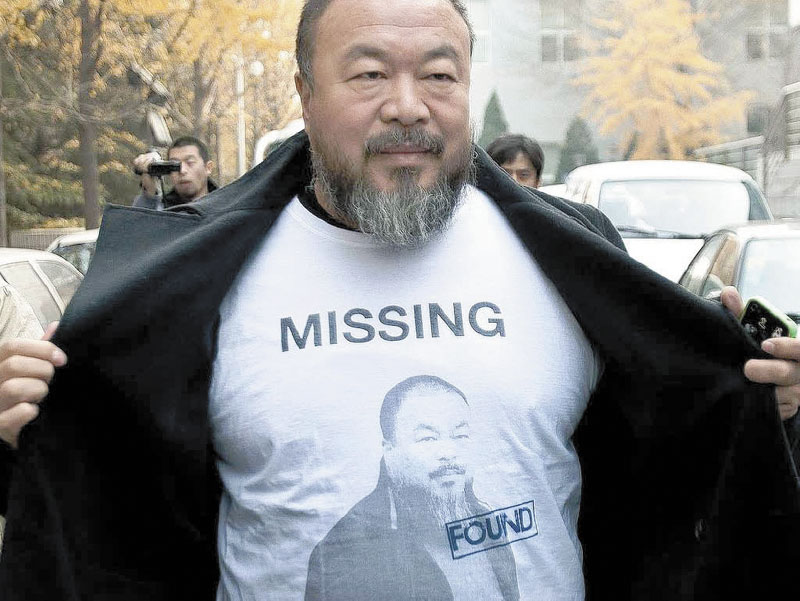“Tell me and I will forget. Show me and I will remember. Involve me and I will understand.”
–A Chinese proverb
China’s Ai Weiwei, artist and photographer, has been in the news more in the past two years than his government is comfortable with.
Ai Weiwei is the brilliant artist who designed and helped build the fabulous Olympic “Birds Nest,” which stunned the art world. But in the past few years, Ai’s activism and challenges to his country’s oppressive policies have drawn him into the international spotlight.
Today at the Maine International Film Festival, filmmaker Alison Klayman’s brilliant documentary, and beautifully photographed “Ai Weiwei: Never Sorry,” brings to the screen so much of what we didn’t know about this great artist, and it’s a startling and educational revelation.
Today at the Maine International Film Festival, filmmaker Alison Klayman’s brilliant documentary, and beautifully photographed “Ai Weiwei: Never Sorry,” brings to the screen so much of what we didn’t know about this great artist, and it’s a startling and educational revelation.
In a 2011 TIME Magazine article about Ai being named runner-up for its Person of the Year, he explained how he got started and how frightening his imprisonment was.
“First they make sure you know that nothing can protect you, no law can protect you. They gave me the example of Liu Shaoqi, the Chinese head of state who was persecuted during the Cultural Revolution and died in prison in 1969. Then they said, “We want to dirty your name. We want to smash your popularity. We want to tell people you’re a liar and dishonest.”
Klayman’s film vividly shows how they went about doing exactly that. She puts much more focus than we’ve seen on Ai’s life in China and his rise to political activism in defense of art and free speech. Ai Weiwei, a big bull of a man with the sensitivity of a swan, has become an icon for freedom of expression worldwide.
Weiwei had seen his father, a revolutionary poet in his own right, suffer in the Cultural Revolution. We’re shown pictures from an album that show the old man being beaten by students and painted with ink. One day in 1981, fed up with what he saw, Ai left for America and stayed, living on Manhattan’s Lower East Side and working as an artist, busboy and waiter until 1993, when he returned home.
Klayman takes us to Ai’s enclave, to his home and studio, which the Chinese government eventually destroyed, and where he lived surrounded by volunteers and assistants who actually do the work that puts together his great art pieces. We view, with astonishment, the field of “hundreds of millions” of sunflower seeds, actually 10 tons of porcelain “seeds” that people can actually walk on at London’s Tate Museum; and his huge display of “Fairytale” chairs welded together. When Ai was imprisoned, it sparked protests all over the world with marches of “1001 Chairs for Weiwei.”
Ai’s real collision with the Chinese government occurred with his massive art project depicting the names and numbers of the children and adults who died in numerous collapsed schools and other buildings in the terrible 2008 Sichuan earthquake.
Klayman shows us the preparation for Ai’s 2009 Munich show, where his assistants covered an entire block-long wall with thousands of colored backpacks that paid tribute to the dead children. It will take your breath away.
Over the years, Ai has made 10 to 15 documentaries that he released to the public online for free. He discovered the Internet and was taught how to start a blog and then use Twitter. His field of expression blossomed.
Klayman’s film actually gives us, the viewer, the feeling of fear and repression that artists and intellectuals feel every day in China. Many of Ai’s contemporaries are interviewed, defending him and speaking openly of their own fears. Nevertheless, they speak.
“Never Sorry” beautifully covers all of Ai’s various exhibitions in the great museums of Europe and around his work space in China, and there are long, ongoing conversations with the artist, who speaks almost flawless English.
We meet his mother, who, like mothers all over the world, sits smiling at her son while twisting her fingers in worry about his future.
We meet his younger brother and his illegitimate son, who plays among his father’s huge exhibits. Little is made of the boy, and questions go unanswered.
We are witnesses of Ai’s sudden incarceration, when he disappears for 81 days. When he is released on a rainy night, there is a frightening scene as reporters and friends meet him at the door of his house. He pushes them aside, saying, “I cannot speak, please, I cannot say a thing. I’m on parole. I cannot say a word.” Then he closes the door on them.
Watching Klayman’s film, we become aware of how we sit on our Chinese-made chairs, dining off plates, silverware and glasses made in China, while Ai and all the writers and artists of China sit under a blanket of repression, valiantly struggling for a clean, free breath of air.
As our children play with Chinese-made toys and we trickle our fingers along the keyboards of smartphones made under oppressive conditions in China, young artists and writers, thinkers are bubbling up from the Internet on blogs and Twitter.
Ai currently is forbidden to leave China; but he is a man of courage, no less than Nelson Mandela or Mahatma Gandhi. No one, not even Ai, knows what will happen next; but because of people like Alison Klayman, the world is watching.
J.P. Devine is a former stage and screen actor.
Send questions/comments to the editors.



Comments are no longer available on this story